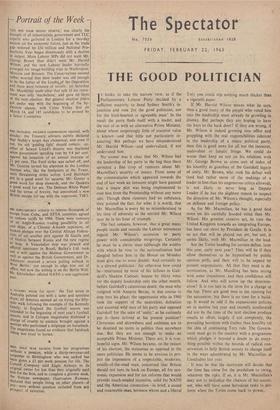THE GOOD POLITICIAN
T looks, to take the narrow view, as if the 'Parliamentary Labour Party decided by a sufficient majority to heed Sydney Smith's in- junction and vote for the good politician, not for the kind-hearted or agreeable man.' In the result the party finds itself with a leader, and the rest of us with an alternative Prime Minister, about whom surprisingly little of essential value is known—and that little not particularly re- assuring. But perhaps we have misunderstood Mr. Harold Wilson—and undervalued, if not underrated him.
No sooner .was it clear that Mr. Wilson had the leadership of his party in the bag than there sprouted a fine crop of rumours about Mr. Macmillan's security of tenure. From some of the commentaries which appeared towards the end of last week an innocent might have guessed that a major plot was being implemented to oust him from the Premiership without any more ado. Though these rumours had no substance, they pointed the fact, for what it is worth, that Mr. Macmillan is every bit as misunderstood in his time of adversity as the untried Mr. Wilson may be in his hour of triumph.
The fact remains, however, that a great many people inside and outside the Labour movement regard Mr. Wilson's accession to party power with considerable misgivings. Certainly he must be a clever man (although the avidity with which he rose to the nationalisation bait dangled before him in the House on Monday must give rise to some doubt). And certainly he is a shrewd politician : for otherwise how could "he—mistrusted by most of his fellows in Gait- skell's Shadow Cabinet; beaten by thirty votes for the deputy leadership only the other month, before Gaitskell's calamitous death; the man who resigned with Aneurin Bevan, in due course to step into his place; the opportunist who in 1960 took the support of the neutralists, defeatists and assorted wild men of his party and opposed Gaitskell for the sake of 'unity,' as he curiously put it—have arrived at his present position? Cleverness and shrewdness and ambition are to be despised no more in politics than anywhere else. But they are not enough to make an acceptable Prime Minister. There are, it is true, hopeful signs. Mr. Wilson became, on the instant of his election, the statesman as opposed to the mere politician. He seems to be anxious to pro- ject the impression of a respectable, moderate, middle-of-the-road man, concerned that Britain should not turn its back on Europe, all for eco- nomic expansion and for tax reforms that would provide much-needed incentive, solid for NATO and the, American connection—in brief, a sound and reasonable man, between whom and a liberal Tory you could slip nothing much thicker than a cigarette paper.
If Mr. Harold Wilson means what he says, then a good many of the people who voted him into the leadership must already be growling in dismay. But perhaps they are hoping to have the keys to the back door? If they are wrong, if Mr. Wilson is indeed growing into office and grappling with the real responsibilities inherent in the leadership. of a major political party,' then this is good news for all but the innocent, malevolent or lunatic fringe. We could do worse than keep an eye on his relations with Mr. George Brown as some sort of index of his Sincerity as guardian of the Gaitskell legacy of unity. Mr. Brown, who took his defeat well (and had rather more of the makings of a leader in him than his ungenerous critics allowed), is not likely to serve long as Deputy Leader if he has the slightest reason to suspect the direction of Mr. Wilson's thought, especially on defence and foreign policy.
As for Mr. Macmillan, he has a good deal more on his carefully hooded mind than Mr. Wilson. His greatest creative act, to turn the United Kingdom towards an integrating Europe, has been cut short by President de Gaulle. It is an act that will be played out yet, but not, it seems likely, with Mr. Macmillan in the lead.
Are the Tories heading for certain defeat, later this year, early next year? They will be if they allow themselves to be hypnotised by public opinion polls, and their will to be sapped by present unpopularity. All that they need is de- termination, as Mr. Maudling has been saying with some impatience, and then confidence will follow. And who will screw up the determin- ation? It is too late in the term for a change at the top. There are good men in the running for the succession, but there is no time for a build- up. It would be odd if the expansionist policies set in motion last year and recently accelerates did not by the time of the next election produce results to offset, largely if not completely, the prevailing boredom with (rather than hostility to) the idea of continuing Tory rule. The Govern- ment must go to the country with a programme which pledges it beyond a doubt to do every- thing possible within the bounds of radical con- servatism to help British society to change itself in the ways -adumbrated by Mr, Macmillan at Llandudno last year.
It may be that the electorate will decide that the time has come for the pendulum to swing, whatever the risks. If so, it is Mr. Macmillan's duty not to prejudice the chances of his succes- sor, who will have some herculean tasks to per- form when the. Tories come back to power.


































 Previous page
Previous page